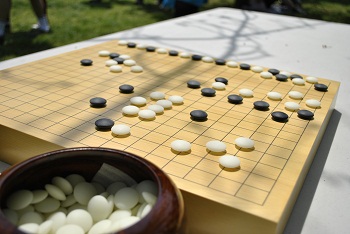Defining Mind Sports and How They Give STEM Students a Brainy Edge

It’s certainly understandable if you’re not familiar with the term “mind sports” and the types of games it encompasses. You may also be unaware that there’s even a sports universe parallel to “physical” sports--you know, the ones that require skill and movement of the body like football, swimming, or tennis.
Mind sports can be defined as a group of games that aim to test your mental ability, strength, and performance. And they’re perfect for students of STEM subjects where academic success requires intellectual weightlifting.
Games That Fall Under the ‘Mind Sports’ Umbrella
So what games qualify as mind sports?
Challenging brain games like chess and backgammon certainly make the cut. There’s even movement underway to have these mind sports included in future Olympic games.
Computer programming, speed reading, and spelling bees are all geektastically awesome and superpowers for those who excel at them. And they’re all mind sports, which makes perfect sense when you think about it. What challenges the brain more than deep coding, polishing off a book in 30 minutes, or correctly spelling obscure words from memory?
Then there are the competitions for solving Rubik’s cube and Sudoku puzzles. Yes, the World Soduku Championships and World Rubik’s Cube Championships are real events!
Poker is also widely recognized as a mind sport, and for good reason. The strategy and critical thinking involved in a poker game really stretches your brain. In fact, learning to bluff like Nawaz may help you in your engineering classes.
In Asia, Go is a very popular board game recognized as a mind sport by prestigious authorities like the International Mind Sports Association (IMSA).
Finally, the electronic sports (E-sports) category of video games played on a computer or device are considered mind sports. In recent years, an increasing number of high-profile events have formed in the E-sports sphere, including tournaments for popular games like League of Legends and Call of Duty.
As you can see, mind sports span a wide range of games, from millennia-old classics to modern video games. The common thread binding these games together is a delectable menu of mental health benefits.

Becoming Better at Game Theory
Researchers have shown that playing mind sports directly aids in developing and bettering cognitive functions. By honing critical thinking and analytical skills, students can become better at studying people and understand what motivates them to make decisions. This knowledge is extremely useful in games, competitions, and generally any situation where there are rewards and consequences for certain actions.
Students are often faced with situations of varying rules and outcomes, and they have to make decisions that determine the course of their future. The game theory mindset could be used to make the most rational decision with the best payoff. This indeed is an invaluable asset!
Improved Memory
This is one of those benefits that isn’t just for the academically gifted; everyone could use a better memory. People who play word games are likely to improve their memories and vocabulary. They often gain speed at recognizing letter formations and word spellings. Activities that strengthen memory also promote increased attention spans, intensity of focus, and information retention.
Enhanced Decision Making
The amount of logical thinking that goes into playing mind sports helps individuals improve their decision making and problem-solving skills. Games like puzzles are renowned for helping people learn patience and determination as well as improve their organizational skills. Consequently, when practitioners are presented with a problem in life, they are better able to dissect the problem, identify patterns, and conceptualize the possible solutions.
Improved Cognitive Ability
Cognitive ability and pattern recognition are some of the perks associated with playing mind sports. Shapes, colors, numbers, categories and a lot of other repetitive features can be remembered and visualized with ease. Students with mind sports training find this trait to be very handy in certain subjects like engineering, architecture, and mathematics.
Mind sports are the ultimate combination of fun and learning. And everyone who values their mental wellbeing, wants to stretch their brains, or desires to build cognitive prowess should indulge in these intellectual games--the rewards are truly mental.

